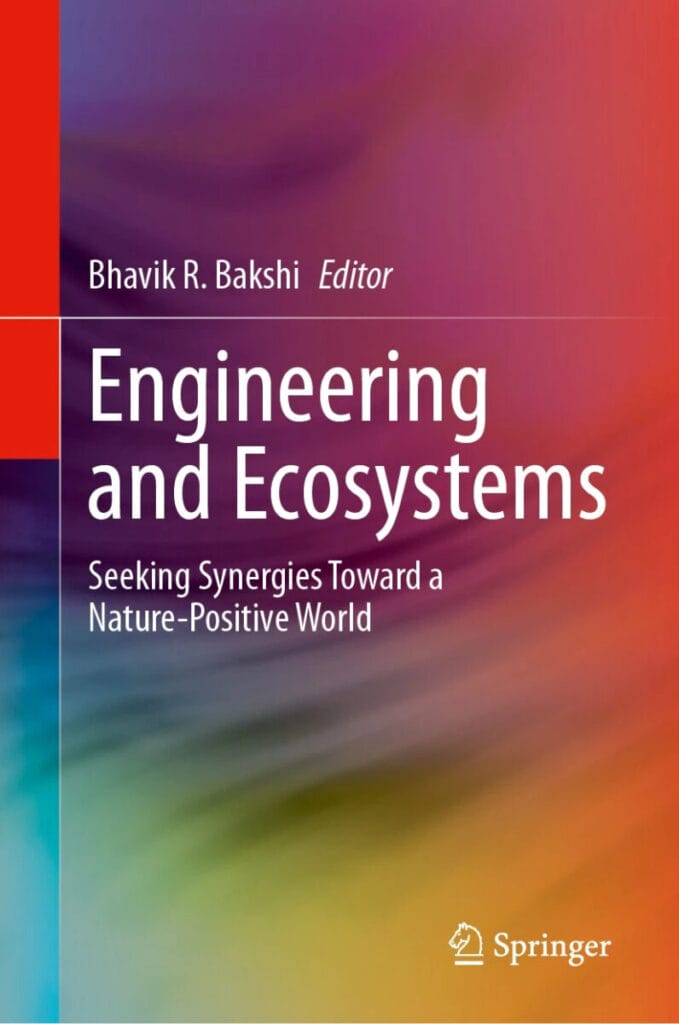The Global KAITEKI Center is very pleased to bring to your attention a book that exemplifies TGKC’s goals and aspirations. The book is titled “Engineering and Ecosystems: Seeking Synergies Toward a Nature-Positive World” and has been edited by TGKC’s principal research leader, Professor Bhavik R. Bakshi.
The book is available here: https://link.springer.com/book/10.1007/978-3-031-35692-6
About the Book
This book demonstrates how the inclusion of nature in engineering decisions results in innovative solutions that are economically feasible, ecologically viable, and socially desirable. It advances progress toward nature-positive decisions by protection and restoration of ecosystems and respect for ecological boundaries. The topic of this book is an active area of academic research, and leading companies are including goals associated with ecosystem services in their sustainability plans. This book is the first collection of methods and applications that explicitly include the role of nature in supporting engineering activities and describes the role that ecosystems play in supporting technology and industry. It describes approaches, models, applications, and challenges for innovation and sustainability that will be useful to students and practitioners.
About the Editor
Bhavik Bakshi holds the Wrigley Professorship at Arizona State University with appointments in the School for Engineering of Matter, Transport and Energy, School of Sustainability, and School of Complex Adaptive Systems. His research is developing systematic methods to ensure that engineering enables an effective transformation toward sustainability. This research results in novel solutions that respect nature’s limits, are socially just, and contribute to economic prosperity. Specific areas of research include life cycle assessment (LCA), product, process, and landscape design for sustainability and a circular economy.
He is also the Director of the newly established center at ASU, which explores pathways for the Transition of the Chemical and Materials Industry Towards a NetZero Future.
Table of Contents
A. Introduction and Motivation
1. Why Should Engineering Account for Ecosystems? B R. Bakshi
2. Ecosystem Goods and Services, Y M. Aleissa, Y Xue, B R. Bakshi
B. Engineering’s Demand for Ecosystem Services
3. Quantifying the Direct and Indirect Demand for Ecosystem Services, K Lee, B R. Bakshi
4. Water Provisioning Services, S Bogra
5. Biogeochemical Cycles: Modeling the Interaction of Carbon and Nitrogen Cycles with Industrial Systems, S Singh
6. The Significance of Insect Pollinators: Opportunities and Challenges, A Jordan, M Unger, V Khanna
7. Biodiversity, F Verones, M Dorber
C. Nature’s Capacity to Supply Ecosystem Services
8. Tools for Mapping and Quantifying Ecosystem Services Supply, Z Wang, K T. Lourdes, P Hamel, T G. Mercer, A M. Lechner
9. Designing with Nature: Incorporating Hydrologic Services in Engineering Projects, P Hamel, A J. Guswa
10. Improved Air Quality and Other Services from Urban Trees and Forests David J. Nowak
11. Services from Agroecosystems and Their Quantification, Sami Khanal
D. Including Nature in Engineering
12. Seeking Synergies Between Technological and Ecological Systems: Challenges and Framework, Bhavik R. Bakshi
13. Making the Business Case for Nature-Based Solutions, M Rogers, F Guertin, E Lonsdorf, C Nootenboom, L McFarlane-Connelly, T Guidry
14. Greenprinting: Urban Planning for Ecosystem Services, R I. McDonald, M Edgecomb
15. Wetlaculture: Solving Harmful Algal Blooms with a Sustainable Wetland/Agricultural Landscape, W J. Mitsch, B Jiang, S K. Miller, K D. Boutin, L Zhang, A Wilson et al.
16. Design of Agroecological Landscapes, R J. Hanes, V Gopalakrishnan, B R. Bakshi
17. Sustainable Supply Chains by Integrating Life Cycle Modeling and Techno-ecological Synergy with Application to Mitigation of Harmful Algal Blooms, T Ghosh, B R. Bakshi
18. Demand and Supply of Air Quality Regulation Ecosystem Services, M Charles
19. Designing Dynamic Synergies Between Ecosystems and Manufacturing Processes, U Shah, B R. Bakshi
20. Assessing Techno-Ecological Synergies in the Life Cycle of Biofuels, Y Xue, R Zhao, B R. Bakshi
21. Designing for Resilience and Sustainability: An Integrated Systems Approach, J Fiksel, B R. Bakshi
E. Socio-economic Aspects of Accounting for Nature
22. Environmental Markets, A Randall
23. Preventing Unintended Harm from Socioecological Interactions, R M. Gunton
F. Directions for the Future
24. Outlook, B R. Bakshi
